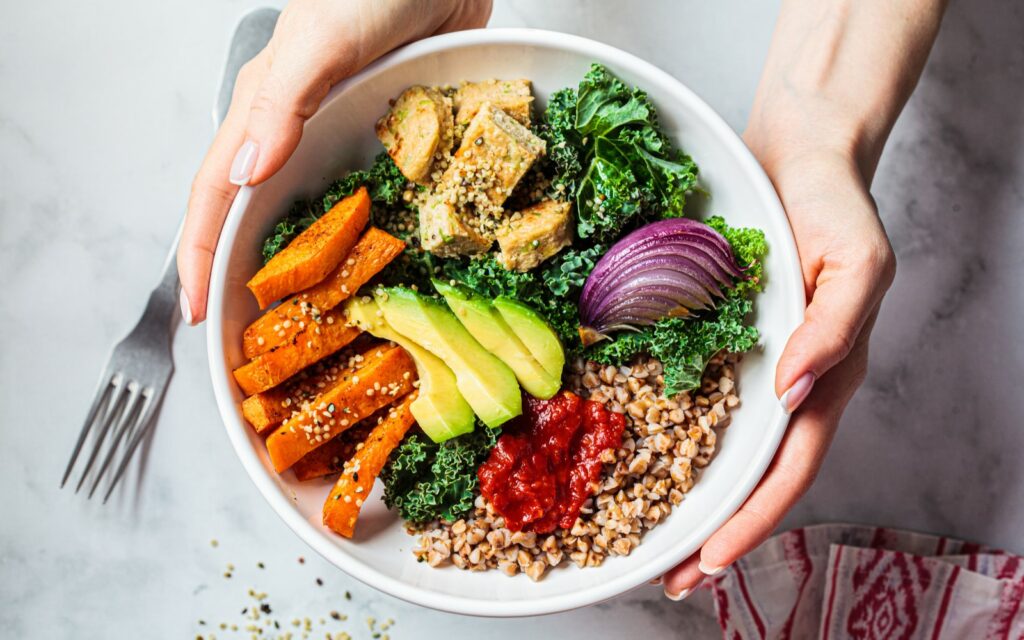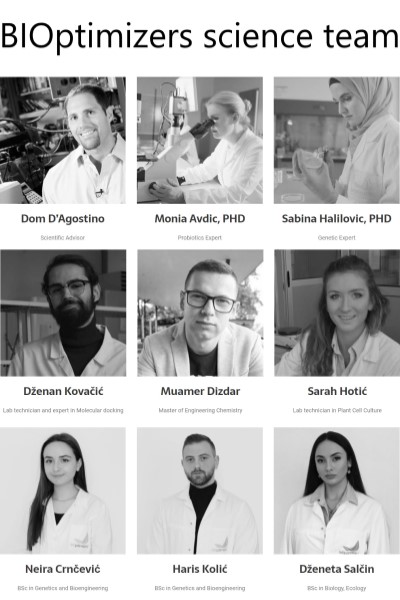
The relationship between gut bacteria and your body, as well as your overall health, is bidirectional. Your body serves as the nurturing environment for the development of these bacteria. Simultaneously, gut bacteria play essential roles in supporting your body and health. They aid in the development of your immune system and act as guardians, defending your body against invaders such as bacteria and toxins.
How To Increase Good Bacteria In The Gut Naturally
The abundance of beneficial gut bacteria is influenced by various factors, which encompass:
• Age
• Diet
• Weight
• How you were born
• Antibiotic usage
Since the process is not entirely straightforward, relying solely on probiotics may not be sufficient. Therefore, this article will guide you on additional natural steps you can take to boost your good bacteria effectively.
1. Eat A Lot Of Plants
Your dietary choices significantly impact your gut bacteria, making a plant-based diet an excellent choice for promoting beneficial microbes. A plant-based diet extends beyond just consuming delightful greens or enjoying green smoothies; it encompasses a wide array of nourishing options.
A plant-based diet includes:
- Fruits
- Vegetables
- Nuts and seeds
- And whole grains like:
- Whole wheat
- Barley
- Buckwheat
- Brown rice
- Millet
- And oatmeal
Adopting a plant-focused diet doesn’t necessitate becoming vegan or vegetarian. You can continue to include fish, chicken, beef, eggs, and dairy products in your meals, but aim to derive the majority of your essential nutrients from plant sources.
During a study examining the impact of diet on gut health, 11 participants followed both plant-based and animal-based diets for a specific period. Each subject was permitted to consume an unrestricted quantity of the provided foods for five days. Notably, both diets brought about rapid changes in the gut microbiota, but they exhibited distinct effects.
Upon consuming the animal-based diet, participants experienced a swift rise in the detrimental bacteria Bilophila wadsworthia, known for its potential to degrade the intestinal wall. However, when adhering to the plant-based diet, the presence of the same harmful bacteria decreased significantly. Consequently, opting for a plant-based diet can effectively reduce the abundance of harmful bacteria in your gut.
2. Address Unhealthy Overgrowth Of Yeasts And Parasites
Within your gastrointestinal tract reside countless microorganisms, comprising bacteria, fungi, parasites, and viruses. Having a substantial and diverse population of beneficial bacteria enables your body to maintain control, creating an environment where the multitude of microorganisms in your gut coexist harmoniously without causing any disturbances.
The naturally occurring yeast and parasites in your body tend to flourish in the presence of harmful bacteria in your gut. Parasites have a tendency to settle in and start depleting your nutrients, leading to potential overgrowth of yeast and harmful bacteria if not addressed promptly. Such an imbalance in your gut microbiota can result in gut dysbiosis. To prevent this, it becomes crucial to undergo testing for these issues and take appropriate measures to address them proactively.
Some signs that your gut is out of balance include:
- Bad breath
- Upset stomach
- Nausea
- Irregularities
- Bloating
- Irritability
- Mental health issues
Although it cannot substitute a thorough functional medicine examination to identify the underlying cause of gut discomfort, Herbal Parasite Guardian comprises a combination of synergistic antimicrobial herbs. This unique blend is effective in inhibiting harmful bacteria, yeasts, and parasites, thereby creating an environment conducive for the growth of beneficial bacteria. Pairing Herbal Parasite Guardian with a low-carb, low-inflammatory diet can make the parasites even more vulnerable to antiparasitic herbs.
3. Use A Weed And Reseed Program
Achieving a harmonious gut balance and promoting the flourishing of good bacteria requires a two-pronged approach: nourishing the beneficial bacteria and eliminating the harmful ones. Similar to tending a garden, you remove the undesirable elements to create space for reseeding with healthy bacteria.
Biome Breakthrough is an exceptional combination of IgYmax and synbiotics (prebiotics and probiotics) that effectively performs the weeding and reseeding tasks for you. IgYmax efficiently clears out harmful bacteria, creating space for the beneficial ones to thrive, while synbiotics enhance the likelihood of good bacteria colonizing your gut.
Within your gut, harmful bacteria tend to congregate in gel-like clusters known as biofilms. These biofilms possess a protective outer layer, making it challenging for your body to eliminate them. However, this is where IgYmax plays a crucial role. IgYmax can effectively inhibit biofilms and eradicate harmful bacteria without harming your beneficial bacteria.
Biome Breakthrough, with the inclusion of synbiotics, facilitates the process of reseeding your gut. Synbiotics consist of both prebiotics and probiotics. Prebiotics are indigestible fibres that create an ideal environment for probiotics to flourish. They serve as nourishment for probiotics, making them even more potent and effective in promoting gut health.
4. Avoid Exposures To Antibiotics Or Things That Can Kill Good Gut Bacteria

Antibiotics can be life-saving in certain situations, and it’s crucial to utilize them when necessary. However, it’s essential to reserve antibiotic usage for those critical moments. Frequent antibiotic exposure can have adverse effects on gut bacteria, reducing their diversity and disrupting the microbial balance. Moreover, each instance of antibiotic exposure raises the risk of developing antibiotic-resistant bacteria, potentially diminishing the effectiveness of future antibiotic treatments.
The disturbance of gut flora caused by antibiotics can significantly elevate the risk of various health problems, including heart disease, mental health conditions and cancers. Regular or prolonged antibiotic use is associated with an increased risk of all-cause mortality and cardiovascular-related deaths.
During a study involving 14 healthy individuals, 12 participants were administered antibiotics, while two served as controls for six days. The researchers observed a harmful impact on gut bacteria, but the consequences did not end there. In addition to the disruption of gut bacteria, the participants who received antibiotics also experienced an increase in fungal growth.
As mentioned earlier, the issue of heightened fungal growth, such as yeast, can lead to overgrowth and, eventually, gut dysbiosis. These changes to your gut can persist for up to 90 days after the course of antibiotics.
5. More Omega-3 And Less Saturated Fats
To enhance the growth of beneficial gut bacteria, make careful choices when it comes to fats. Saturated fats have been observed to negatively impact good bacteria while promoting the growth of harmful ones. On the other hand, incorporating omega-3 fatty acids into your diet can help increase the abundance of good gut bacteria.
Within your gut, two primary bacterial kingdoms exist: Firmicutes and Bacteroidetes. Certain types of Firmicutes have been linked to inflammation and weight gain, while Bacteroidetes are known to combat inflammation and may be associated with a leaner body composition. The fats you consume can play a crucial role in determining which bacteria flourish in your gut.
If you’re uncertain whether a fat is saturated, consider its state at room temperature. If it remains solid, it is likely saturated fat. Here are some examples:
- Butter, margarine, or shortening
- Animal fats like in lard or in the cuts of meat themselves
- High-fat dairy like whole milk, cheese, ice cream and sour cream
To boost your beneficial gut bacteria, focus on consuming Omega-3s. These essential fats are vital because your body cannot produce them on its own. The sole means of obtaining Omega-3s is through your diet or supplementation.
Unlike saturated fats, Omega-3s are liquid at room temperature. Some healthy sources of Omega-3s include:
- Fatty fish like mackerel, sardines, salmon, and herring
- Cod liver oil
- Flaxseed
- Chia seeds
- Walnuts
6. Eat Fermented Foods
Lastly, consider incorporating fermented foods into your diet. Not only are they delicious, but they also offer a delightful way to introduce healthy bacteria. Fermented foods have been part of the human diet since ancient times and can be a valuable addition to support gut health.
Some common examples include:
- Yogurt
- Pickles
- Sauerkraut
- Kombucha
- Kefir, water or yogurt
- Miso
- Kimchi
During fermentation, microorganisms such as fungi and bacteria break down carbohydrates like starches or sugars into alcohols, acids, or gases. This process leads to beneficial side effects such as improved digestibility and the cultivation of healthy microorganisms that provide support to your gut bacteria.
If you haven’t included fermented foods in your diet yet, consider incorporating them gradually to prevent any potential digestive discomfort. When purchasing commercially prepared fermented products, ensure they are not pasteurized. Pasteurization eliminates live microorganisms and reduces the benefits. Nonetheless, all fermented foods contain postbiotics, which are the beneficial byproducts of good bacteria fermentation that provide nourishment for your gut and gut flora.
The Takeaway
To support optimal gut health, it is crucial to have an ample supply of beneficial gut bacteria. Relying solely on probiotics is not sufficient; additional measures are necessary.
To enhance your gut health, consider increasing your intake of plants and fermented foods while minimizing the use of antibiotics and antimicrobials. Additionally, opt for Omega-3s over saturated fats. These steps pave the way for improved gut health. Moreover, addressing issues such as yeast and parasites is crucial to maintaining the right balance for a healthy gut.


